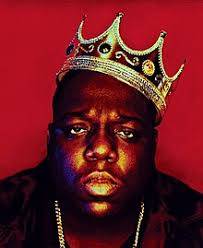The Notorious B.I.G., born Christopher George Latore Wallace on May 21, 1972, in Brooklyn, New York, was a defining figure in the world of hip-hop, renowned for his storytelling ability, larger-than-life presence, and influence on the East Coast rap scene. Known by several names, including Biggie Smalls, Biggie, or simply B.I.G., he rose to prominence in the 1990s and became one of the most iconic rappers of all time before his tragic death at the age of 24.
Early Life and Upbringing
Biggie was raised in the Brooklyn neighborhood of Bedford-Stuyvesant by his mother, Voletta Wallace, a Jamaican immigrant and school teacher. His father, George Latore, left the family when Biggie was two, leaving Voletta to raise her son on her own. Despite her efforts to provide a stable environment, the lure of the streets eventually caught Biggie’s attention. By his early teens, he was involved in drug dealing and other illegal activities, but he also had a love for music, often rapping in his neighborhood and gaining respect for his lyrical skills.
Biggie attended the same high school as Jay-Z, though he dropped out at 17 to focus on hustling full-time. His involvement in crime led to several run-ins with the law, including a brief stint in jail in 1990. Upon his release, Biggie decided to take his music career more seriously.
Breakthrough and the Rise to Fame
In 1992, Biggie recorded a demo tape under the name Biggie Smalls, which caught the attention of Sean “Puffy†Combs, who was then an A&R executive at Uptown Records. When Combs left Uptown to form Bad Boy Records in 1993, he signed Biggie as one of his first artists. Biggie soon began to work on his debut album, and his unique blend of grim street narratives with smooth, jazz-infused production quickly made him stand out.
In 1994, The Notorious B.I.G. released his debut album, Ready to Die, which was an instant success. The album included hits like “Juicy,†“Big Poppa,†and “One More Chance,†which showcased his effortless flow, vivid storytelling, and ability to switch between gritty street tales and commercial appeal. Ready to Die is widely considered one of the greatest hip-hop albums of all time, earning both critical acclaim and commercial success, ultimately going multi-platinum.
Rivalries and the East Coast-West Coast Feud
As Biggie’s star rose, tensions between the East Coast and West Coast hip-hop scenes began to escalate, with Biggie becoming a central figure in the rivalry, particularly due to his strained relationship with Tupac Shakur. Biggie and Tupac were once friends, but a 1994 shooting of Tupac in New York City, which Tupac believed Biggie had knowledge of, fueled a bitter feud between the two artists.
The media and fans magnified the rivalry, which spiraled into a full-blown East Coast-West Coast war between their respective record labels, Bad Boy (East Coast) and Death Row (West Coast). Biggie’s 1995 hit “Who Shot Ya?†further intensified tensions, with many interpreting the song as a taunt directed at Tupac, though Biggie denied this. The feud contributed to an increasingly toxic atmosphere in hip-hop.
Tragic Death
On March 9, 1997, The Notorious B.I.G. was shot and killed in a drive-by shooting in Los Angeles. His death occurred just six months after Tupac’s murder, which remains unsolved to this day. Biggie was 24 years old at the time of his death, and the identity of his killer remains unknown, though many speculate that his murder was connected to the East Coast-West Coast feud.
Posthumous Legacy and Influence
Just two weeks after his death, Biggie’s second album, Life After Death, was released. It became a critical and commercial triumph, debuting at No. 1 on the Billboard 200 and featuring hits like “Mo Money Mo Problems†and “Hypnotize.†The album solidified Biggie’s legacy as one of the greatest rappers of all time. His posthumous releases, including the albums Born Again (1999) and Duets: The Final Chapter (2005), further cemented his place in the pantheon of hip-hop legends.
Biggie’s influence on hip-hop culture remains profound. His distinctive voice, impeccable flow, and ability to tell complex, emotional stories through his lyrics set a new standard for the genre. Artists like Jay-Z, Nas, and Kendrick Lamar have cited Biggie as a major influence, and his impact continues to be felt in both the music and fashion worlds.
Beyond music, The Notorious B.I.G. also left a lasting cultural legacy as a symbol of the golden era of 1990s hip-hop, representing the gritty reality of street life while achieving mainstream success. His image as the “King of New York†remains iconic, and his life and music are often celebrated in documentaries, films, and tributes.
Despite his short career, Biggie’s impact on hip-hop is immeasurable, and his music continues to resonate with fans across generations. His ability to turn the harsh realities of his life into timeless art has ensured that The Notorious B.I.G. will forever be remembered as one of the greatest rappers of all time.




No comments yet
Be the first to share your thoughts!